| Srl | Item |
| 1 |
ID:
122350
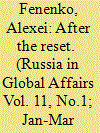

|
|
|
|
|
| Publication |
2013.
|
| Summary/Abstract |
The general environment of U.S.-Russian relations up to 2020 will remain conflict-prone, especially as Russia and the United States lack a complex of stabilizing economic ties, like those in U.S.-Chinese relations. The nuclear missile parity remains the sole stabilizer.
|
|
|
|
|
|
|
|
|
|
|
|
|
|
|
|
| 2 |
ID:
121573
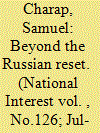

|
|
|
|
|
| Publication |
2013.
|
| Summary/Abstract |
WITH THE recent downturn in U.S.-Russian relations, observers in both Washington and Moscow have remarked upon the cyclical nature of this key bilateral relationship. As Fyodor Lukyanov, a leading Russian commentator, noted in late 2012, "If we look at the relationship since 1991, it's the same cycle all the time, between kind words and inspiration and deep crisis. Yeltsin, Clinton, Bush, Putin, Obama, it's the same pattern." Indeed, the phases of high hopes and expectations in the years 1991-1994, 2000-2003 and 2009-2011-followed by deep disappointment in the intervening and subsequent years-do seem to represent a cyclical pattern.
|
|
|
|
|
|
|
|
|
|
|
|
|
|
|
|
| 3 |
ID:
111975
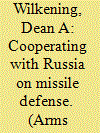

|
|
|
| 4 |
ID:
128097
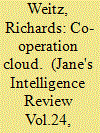

|
|
|
|
|
| Publication |
2012.
|
| Summary/Abstract |
Russia's announcement that it does not want to renew the co-operative threat reducing programme with the United States has raised questions about the bilateral relationship. Richard Weitz investigates what it means for future agreements.
|
|
|
|
|
|
|
|
|
|
|
|
|
|
|
|
| 5 |
ID:
118732
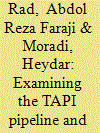

|
|
|
|
|
| Publication |
2012.
|
| Summary/Abstract |
Before 1991, the states of Central Asia were marginal backwaters, republics of the Soviet Union that played neither a major role in the Cold War relations between the U.S.S.R. and the United States, nor in the Soviet Union's relations with the principal regional powers of Turkey, Iran, and China. But in the 1990s, the dissolution of the Soviet Union coincided with rediscovery of the energy resources of the Caspian Sea, attracting a wide range of international oil companies, including American majors, to the region. Eventually, the Caspian Basin became a point of tension in U.S.-Russian relations. In addition, Central Asia emerged as a zone of conflict between the regional and cross-regional powers. The events of 11 September, 2001 and the terrorist groups operating in Afghanistan brought Central Asia to the forefront of U.S. attention. The growing importance of natural gas imports to today's economies is compelling the world community to think anew about energy security.
|
|
|
|
|
|
|
|
|
|
|
|
|
|
|
|
| 6 |
ID:
126393


|
|
|
| 7 |
ID:
119006


|
|
|
| 8 |
ID:
128079


|
|
|
|
|
| Publication |
2013.
|
| Summary/Abstract |
The U.S.-Russian agreement on Syria's chemical weapons is a recent, powerful reminder of the extraordinary value of arms control. An arduous process to find and destroy the chemical arsenal of Syrian President Bashar al-Assad lies ahead. Yet, it is made much simpler by the aggregation of expertise and baseline of protocols and procedures under the Chemical Weapons Convention (CWC), which was negotiated under President George H.W. Bush and ratified under President Bill Clinton. Imagine the difficulty of starting this effort without those assets. Why then is the United States degrading its capability to design, negotiate, and lead efforts to enforce agreements such as the CWC? In late 1999, the independent U.S. Arms Control and Disarmament Agency (ACDA) was folded into the Department of State, a process in which I was deeply involved as ACDA's last director. I had high hopes for the reorganization. While creating an institutional home in a larger, more powerful agency, the plan on which ACDA and the State Department had agreed, with congressional approval, preserved ACDA's two most irreplaceable assets-an independent voice for arms control and nonproliferation priorities at the highest levels of the government and protection of job security and career opportunities for the technical experts whose skills and insights were indispensable to success.
|
|
|
|
|
|
|
|
|
|
|
|
|
|
|
|
| 9 |
ID:
153329
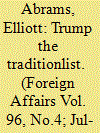

|
|
|
| 10 |
ID:
122349
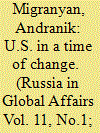

|
|
|
|
|
| Publication |
2013.
|
| Summary/Abstract |
The U.S. is going through a painful process of shifting from unilateral global domination towards creating a balance of power in various regions of the world in order to preserve its presence and influence. This means that, as before, we can expect ups and downs in U.S.-Russian relations.
|
|
|
|
|
|
|
|
|
|
|
|
|
|
|
|
| 11 |
ID:
091676


|
|
|
|
|
| Publication |
2009.
|
| Summary/Abstract |
Post-Cold War "lab-to-lab" collaborations on unclassified scientific issues between U.S. and Russian nuclear weapons laboratories set the stage for bilateral cooperation in materials control and other nuclear areas. They also became the major element in a cooperative process initiated by a Presidential Decision Directive to ensure Russia's compliance with the Comprehensive Nuclear-Test-Ban Treaty. These collaborations have always been highly favored by leaders of the Russian nuclear weapons complex-the same leaders who oversee Russia's participation in various government-to-government programs. This article reviews these collaborations and examines the possibility that U.S. rebuffs of Russian proposals and the U.S. failure to keep promises of expanded collaboration could contribute to Russia's reluctance in major programs and even lead to a return to nuclear testing by Russia. The author argues that a renewed U.S. commitment to the process should be an immediate goal of the Obama administration and is an essential step in re-engaging Russia to solve the nuclear problems remaining from the Cold War. Steps for doing so are recommended.
|
|
|
|
|
|
|
|
|
|
|
|
|
|
|
|
| 12 |
ID:
161994


|
|
|
| 13 |
ID:
096851
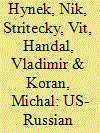

|
|
|
|
|
| Publication |
2009.
|
| Summary/Abstract |
The article examines the reactions of selected European states to the US-performed 'reset' in relations with Russia and explores the ways in which they have been adapting to the new set-up. The article is divided into three parts: after the discussion of the substantive continuity and limited change in US foreign and security policy (USFSP), the multilateral and bilateral dimensions of USFSP procedure are examined through John Ruggie's theoretical observations. The second part of the article deals with implications of the USFSP for Central-Eastern European countries. This part begins with a discussion of Russian attempts to wheedle Europe into embracing its plans for new European security architecture. The next section sheds light on the unexpected process of strategic realignment of the region (USA/NATO/EU/CSDP) and simultaneous transformation of the special relationship with the USA into 'normal life'. The third part of the article tackles the implications of heightened US-Russian bilateralism for Germany. Authors' findings, many of them based on conducted elite interviews, suggest the contrary process, namely Germany's strengthened multilateral commitment to the EU and specifically to European Security and Defence Policy, limiting the bilateral option to energy trade with Russia. What follows are concluding remarks.
|
|
|
|
|
|
|
|
|
|
|
|
|
|
|
|
| 14 |
ID:
115610
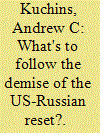

|
|
|
| 15 |
ID:
115606
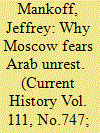

|
|
|
|
|
| Publication |
2012.
|
| Summary/Abstract |
Throughout the upheaval in the Arab world, Moscow has been firmly on the side of the status quo. . .
|
|
|
|
|
|
|
|
|
|
|
|
|
|
|
|